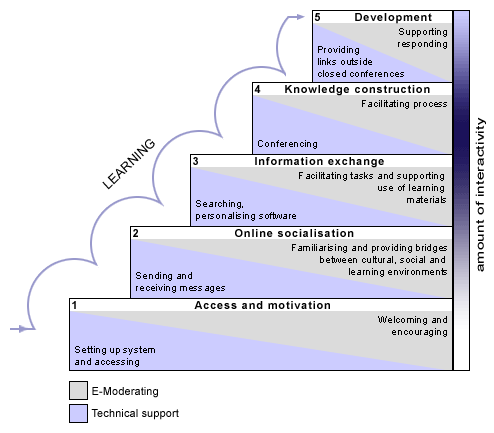Chapter 2: The 5 Stage Framework and e-Activities.
How would teachers act like an e-moderator
In order for e-activities to work successfully in a classroom the 5-stage framework of teaching and learning has been implemented.
For every platform to work successfully each stage needs the “participants”, in this case the students, to work successfully. Each stage focuses on building the correct personal identities for individuals to collaborate and share information. Students would have to master certain technical skills and good human intervention and assistance is required for students to achieve this level. For example, if we put stage 1 and 2 in to context for an e-learning platform it would include children uploading pieces of work and sending comments to other students on their work. The class teacher would act as an e-moderator to assess whether the comments being made are appropriate, whether the audience are engaging well, providing students with helpful feedback and general maintaining an active online collaborative community.
A key area that e-moderators need to maintain includes motivation. One of the key messages of the text includes teachers having the responsibility of “enticing” children. This means a constant sense of engagement is required. As an e-moderator, teachers would need to ensure that the e-learning platform is kept current. For example, introducing new topics of discussion and tasks regularly in to the e-learning area. This means students will not get bored as there is live action taking place which takes up on to the next stage of arriving. Some students may not arrive and be active on the e-learning platform, they may require an extra push or level of encouragement. Therefore, a good design of the e-learning platform is crucial, making it fun and presentable. As a designer, it’s important for me to understand my audience, the students abilities and understanding their interests. If we do suitable research and exchange information well, we can construct an area of knowledge that can be shared amongst a wide community but is mainly specialized for the students we aim the reading club purpose for. Lastly, the point of maintaining the e-learning platform is another area of a successful frame of teaching. As mentioned above, children need to be kept interested as they often get bored. How would I plan to engage my students successfully? Well, of course, keeping the e-learning platform up do date and current is an important area, however, allowing the children to lead the focus of work is also important. Perhaps opening a room discussion on asking what students would like to read, giving them opportunities to share anything they have seen or experienced that is interesting etc.
Overall, the teacher acts as managers of learning, however, I see it as children being the directors of the assigned tasks as they lead the frame of discussion. Therefore, as e-moderators, it is important we listen to what children want and are interested in.

After reading this and seeing several abandoned school blogs, do you think it’s possible to train and motivate children to maintain blogs and/or learning platforms themselves?
It depends on the nature of the blog. If it is based around a topic which interests children and keeps them engaged then I don’t see why not…
Children enjoy being in control of their own learning and blogs allow them to handle and manage their personal e-learning space independently.